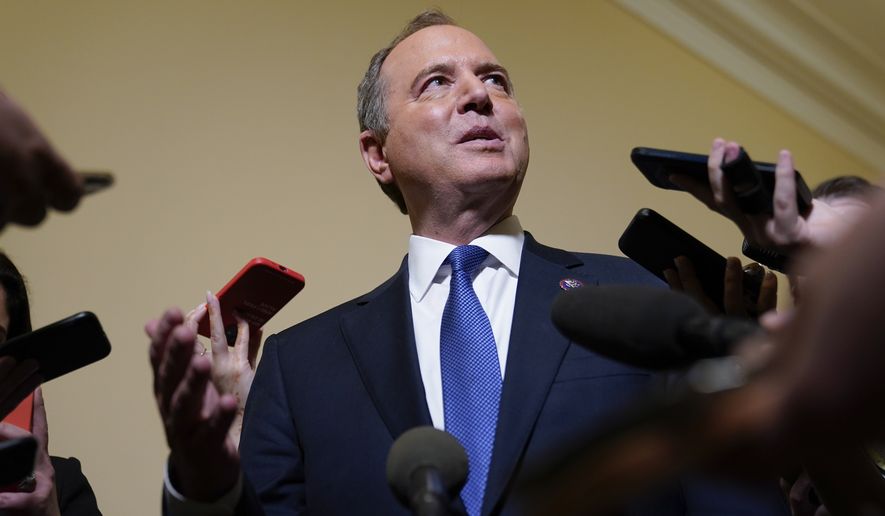Rep. Adam B. Schiff, chairman of the House Permanent Select Committee on Intelligence, wants a defense policy bill to include language blocking Congress from oversight of the military and National Guard in some cases of domestic deployment.
The amendment is poised to be added to the National Defense Authorization Act, which the House plans to take up this week, and it has drawn criticism from Republicans who fear Mr. Schiff is trying to preemptively block them from oversight if their party wins the House majority in November elections.
“This un-American amendment will fundamentally and irreparably erode Congress’ constitutional oversight responsibility,” Rep. Elise Stefanik of New York, a member of the Armed Services Committee and chairwoman of the House Republican Conference, told The Washington Times. “House Democrats led by Adam Schiff are attempting to cover up for the national security crises of the weakest commander in chief in U.S. history.”
The exemption from congressional oversight is narrowly focused on the domestic deployment of troops, but Mr. Schiff’s free pass for the Pentagon could impact a range of oversight from border security to the Jan. 6, 2021, riot at the U.S. Capitol.
Mr. Schiff, California Democrat, first introduced the measure in 2020. He cited then-President Trump’s proposal, which he never carried out, to deploy the U.S. Army to quell social justice riots that were ravaging cities across the country.
Advocates touted the Schiff measure as a bill that would suppress evidence obtained by the military during unlawful deployment domestically.
The Brennan Center for Justice was among dozens of groups to back the measure. They said it would “establish clear consequences to deter the government” from wrongfully deploying the military in civil law enforcement situations under a law known as the Posse Comitatus Act.
The 1878 law prohibits the Army or Air Force from enforcing U.S. laws unless authorized by the Constitution or Congress.
Transparency advocates say Mr. Schiff’s proposal, which would suppress evidence and expand the act to all military branches, is overly broad and goes too far in shielding the military from scrutiny. It could also block Republicans in Congress from planned oversight of the Biden administration.
“This is the opposite of a good governance and transparency amendment,” said Charles Stimson, the deputy director of the Edwin Meese III Center for Legal Judicial Studies and manager of the National Security Law Program at The Heritage Foundation. “And it really stinks to high heaven.”
Mr. Stimson, who served as a deputy assistant secretary of defense under President George W. Bush, said the measure would block the courts and Congress from oversight of the military and information collected by the military if the deployment is deemed in violation of the Posse Comitatus Act.
“If somebody from the armed forces, or perhaps even the National Guard, who were brought up into service under federal authority, were given a direct order which they thought were lawful, but it was actually not a lawful order, but they didn’t have the gumption to know whether it was or not, they can’t be brought before the House or subcommittee of the House,” Mr. Stimson said.
SEE ALSO: House Jan. 6 committee postpones Thursday’s prime-time hearing
A spokeswoman for Mr. Schiff said no Republican opposed the measure in 2021 when it passed by voice vote as an amendment to the National Defense Authorization Act. The language was cut from the House-Senate compromise that Congress passed in December.
House Republicans are paying closer attention to the Schiff amendment now that they are poised to reclaim the majority and the oversight gavel. They plan investigations and hearings on the Biden administration’s handling of the illegal immigration surge along the southern border, where thousands of Texas National Guard troops have been deployed.
Republicans also plan to examine security failures in the U.S. Capitol on Jan. 6, 2021, when rioters stormed the building. They want to know why congressional leaders rejected help from the National Guard in advance of the riot.
“Yes, I’m very concerned about it, and Republicans need to fight back against it in the House and Senate to make sure it doesn’t pass,” Rep. Jim Banks, an Indiana Republican on the Armed Services Committee, said in an interview. “Democrats know we are going to take back the majority and are already trying to tie our hands when we do.”
Schiff aides said Republicans are misrepresenting the amendment, which will get a vote before the House Rules Committee on Tuesday. The amendment is expected to pass and be included in the final legislation for a vote later this week.
“It should come as no surprise that Republican conspiracy theorists have misrepresented Rep. Schiff’s amendment,” Schiff spokeswoman Lauren French said. “The measure prevents presidents, of any party, from unlawfully using our nation’s armed forces in a domestic law enforcement capacity against Americans exercising their constitutionally protected rights. This is something both parties should support and did support when it passed the House by voice vote in 2021. This amendment deters violations of the law by prohibiting the use of unlawfully obtained evidence by the government in a court or other legal proceeding — it would not prevent any congressional oversight as some conspiracy theorists have falsely claimed. By ensuring the government cannot prosecute Americans using evidence obtained illegally, we can protect our fundamental freedoms.”
• Susan Ferrechio can be reached at sferrechio@washingtontimes.com.
• Kerry Picket can be reached at kpicket@washingtontimes.com.




Please read our comment policy before commenting.